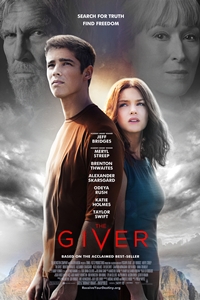 The Giver
The Giver
Directed by Phillip Noyce
Starring Brenton Thwaites, Jeff Bridges, Meryl Streep, Katie Holmes and Alexander Skarsgård
From The Weinstein Company
Rated PG-13
100 minutes
The Giver
by Michael Clawson of Terminal Volume
Here’s the funny thing about freedom of choice: the characters in The Giver might not have it, but we as audience members do. And I recommend you choose something different to watch this weekend.
It’s not that The Giver is an awful movie — it’s rather splendid to look at, and the two key performances are noteworthy — it’s just that The Giver is woefully broken from its premise on up. Take for example, the deus ex machina from the third act: a translucent “memory bubble.” What does the bubble have to do with the plot? Nothing. What does the bubble solve? Everything. But problems begin long before bubbles blow up Phillip Noyce’s incomprehensible movie based on the popular Lois Lowry’s pre-young-adult young adult book.
It takes place in one of those dystopian utopias where people all look like walking-talking Apple products, their uniforms stitched together by a design team in Cupertino, speech patterns that are robotic and vaguely clinical, and their bicycles are props from a 1964 World’s Fair movie about “the Future.” The movie has a nice look, but an empty heart. We begin with Jonas (Brenton Thwaites), who feels like he’s different than other teens, a fact corroborated during his graduation ceremony when he’s paired with the Giver (Jeff Bridges), the community’s keeper of memories and a knowledge.
This sci-fi civilization has largely forgotten its history, from dancing and love to war and famine, because everyone is required to take drugs that blur memories, suppress dreams, stifle moods, inhibit feelings and take away the ability to choose. This, we’re told by the Chief Elder (Meryl Streep), is because when people choose they often choose wrong. By taking away memory, choice, history, pain and even color — the movie is shot in black and white at the beginning — the people are promised a peaceful society, but also a hollow one. And this is where the Giver comes in. He’s supposed to retain all the memories from the more tumultuous days in case they’re ever needed (they aren’t) or in case he’s summoned to provide political advice (he isn’t) to the high elders. It seems like the Giver and his vault of memories are kept around because the elders are dystopian hoarders.
The Giver, all gruff and snappy underneath Bridges’ grumpy performance, begins teaching Jonas what’s rattling around up in his head. They do this by holding hands so the Giver can transfer what can only be described as first-person GoPro and YouTube videos directly into Jonas’ brain. Each new memory opens up Jonas’ world more and more until he begins questioning the whole structure of his society. And then off he sleds to the “memory bubble” to reboot the population.
We’ve seen movies, and book-turned-movies, like this before, including 1984, Terry Gilliam’s Brazil, Fahrenheit 451, Gattaca and even The Hunger Games movies, but The Giver seems to most closely identify with Kurt Wimmer’s cult gun-fu action bonanza Equilibrium and, strangely enough, Gary Ross’ Pleasantville, which saw modern-day characters enter into a Leave It To Beaver-style TV show. Yes, Pleasantville, like The Giver, has long segments in black and white and then slowly introduces color during its characters’ awakenings, but it also nailed many of these same plot devices that The Giver fumbles.
Pleasantville, through its inventive writing, managed to have an open dialogue about choice and emotion and passion and pain without sacrificing the moral dilemma of the film’s universe. But here, no dialogue of that magnitude exists because it’s all been boiled down to a memory bubble that solves everything and nothing at the same time. In the film’s most awful moment, Jonas’ dad euthanizes a baby in a scene that’s meant to show how detached from reality the society has become. But with no moral reckoning for this behavior, the film essentially kills a baby for nothing. It’s an agonizing scene that proves that not only is the character detached from reality, but so is the movie.
Ignoring it’s broken center, The Giver does look rather snazzy. The effects pop and the designs are appropriately modern. Thwaites and Bridges share some scenes that are effective at establishing their complicated roles as teacher and student, or giver and receiver (stop snickering). Katie Holmes plays an unfeeling mother in what could easily be considered a skewering of Scientology. Alexander Skarsgård, so great in everything he’s in, has to kill a baby, an act from which his character never recuperates. Much of the dialogue is angular and awkward, a result of the society’s strict use of “precision of language.”
Really, though, there’s not much to love in this movie. It’s astonishingly deaf with its plot and themes, and the memory bubble finale is insulting.
And speaking of memory bubbles, maybe there’s one this movie can be stuffed into.









